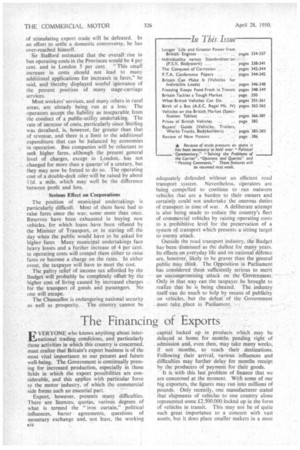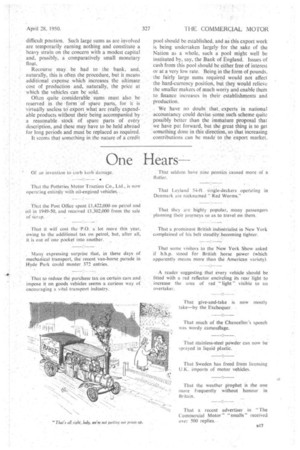The Financing of Exports
Page 50

Page 51

If you've noticed an error in this article please click here to report it so we can fix it.
EVERYONE who knows anything about international trading conditions, and particularly those activities in which this country is concerned, must realize that Britain's export business is of the most vital importance to our present and future well-being. The Government is continually pressing for increased production, especially in those fields in which the export possibilities are considerable, and this applies with particular force to the motor industry, of which the commercial side forms such an essential part.
Export, however, presents many difficulties. There are licences, quotas, various degrees of what is termed the "iron curtain," political influences, barter agreements, questions of monetary exchange and, not least, the working capital locked up in products which may be delayed at home for months pending right of admission and, even then, may take many weeks, if not months, to reach their destinations. Following their arrival, various influences and difficulties may further delay for months receipt by the producers of payment for their goods.
It is with this last problem of finance that we are concerned at the moment. With some of our big exporters. the figures may run into millions of pounds. Only recently, one manufacturer stated that shipments of vehicles to one country alone represented some £2,500,000 locked up in the form of vehicles in transit. This may not be of quite such great importance to a concern with vast assets, but it does place smaller makers in a most difficult position. Such large sums as are involved are temporarily earning nothing and constitute a heavy strain on the concern with a modest capital and, possibly, a comparatively small monetary float.
Recourse may be had to the bank, and naturally, this is often the procedure, but it means additional expense which increases the ultimate cost of production and,' naturally, the price at which the vehicles can be sold.
Often quite considerable sums must also be reserved in the form of spare parts, for it is virtually useless to export what are really expendable products without their being accompanied by a reasonable stock of spare parts of every description, and these may have to beheld abroad for long periods and must be replaced as required.
It seems that something in the nature of a credit pool should be established, and as this export work is being undertaken largely for the sake of the Nation as a whole, such a pool might well be instituted by, say, the Bank of England. Issues of cash from this pool should be either free of interest or at a very low rate. Being in the form of pounds, the fairly large sums required would not affect the hard-currency position, but they Would relieVe the smaller makers of much worry and enable them to finance increases in their establishments and Production.
We -have no daubt that. experts in national .accountancy could devise Sonic such scheme quite -possibly better than the immature proposal that we have put forward, but the great thing is to get something done in this direetion, SO that increasing contributions can be made to the export market.




































































































































































































